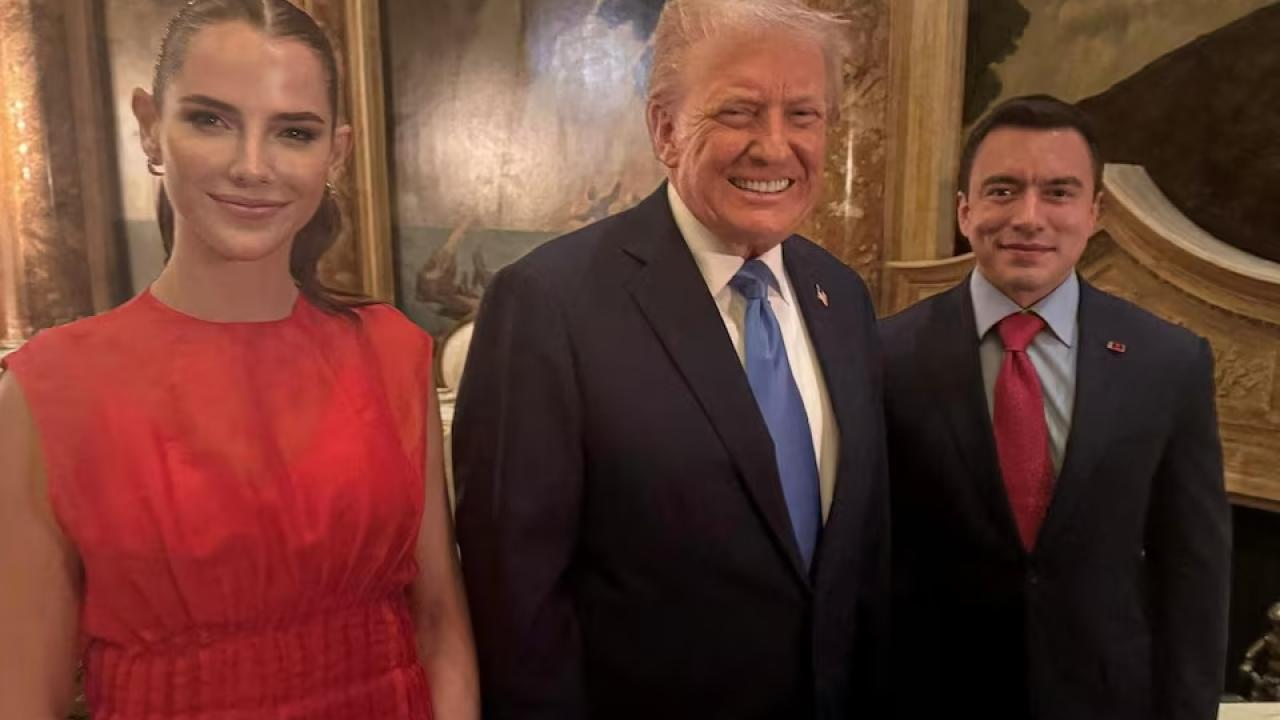
Analysts reviewed what has happened in the process of seeking a trade agreement with the North American country.
The trade relationship between Ecuador and the United States "has been, is, and will be very important." There have been "low and good years," and for decades the country has been seeking a sustainable and permanent mechanism to establish these relations. However, an "Ecuadorian policy error" halted negotiations for a trade agreement and created a "gap" compared to its neighboring countries, which have enjoyed preferential treatment, even amid the current global tariff crisis.
The former minister of Production, Foreign Trade, Investment, and Fisheries Daniel Legarda; the executive president of the Ecuadorian Export and Investment Promotion Corporation (Corpei), Eduardo Egas; and the executive director of the Ecuadorian Institute of Political Economy (IEEP), Joselo Andrade, analyze Ecuador's progress in seeking a trade agreement with the U.S.
Legarda comments that the overall trade relationship with the United States has been "outstanding, good, necessary, complementary. There have been good and bad years." Even before trade records existed, it was already an important market for products like cocoa, and the first investment in banana development came from companies in that country.
Andrade comments that before the 1990s, there was what is known as the Generalized System of Preferences, whose intention was to allow certain benefits in the placement of Ecuadorian products in the US market and already in the 1990s, however, the Trade and Investment Council (TIC) appeared, which would be, or should be, the prelude to a longer-term and permanent agreement, known as TLC (Free Trade Agreement), opening the doors to the dialogue necessary to reach the scenario described.
Legarda believes things began to change for the better when the Andean Trade Preferences and Drug Eradication Act (ATPDEA) was passed at the beginning of the last decade. This led to the development of new export products, particularly in the Sierra, such as flowers and broccoli. Even canned tuna became more accessible to that market. Then, little by little, other products began to be included in this preference program. It was attractive, and this had a counterpart in the fight against drugs.
ECUADOR "LAGGING BACK"
He adds that after that, discussions on trade agreements advanced much more in 2005, 2006, 2007, but Ecuador was left out of the FTA, Colombia and Peru advanced, and that "was an important turning point because we fell behind in terms of the relationship," because having a partner with an FTA is not the same as having a partner without one.
Andrade notes that for ideological and political reasons, as well as pressure from certain interest groups, Ecuador withdrew from the negotiating table in April 2006, during the Alfredo Palacio administration.
With that outlook, Legarda says we lost advantage over competition from Peru and Colombia, whose agreements came into force in 2009 and 2010, respectively, and from those years onwards, Ecuador began to lose market share, and this is reflected in flowers, some prepared food products, etc., while other products such as tuna face direct competition not with Colombia, but with Asian countries.
RELATIONSHIP WITH THE U.S. IS "BURIED"
And the situation remained tense in the following years, according to the three experts. "During Rafael Correa's administration, any relationship with the United States was completely buried, due to the latter's involvement in 21st-century socialism, a movement ideologically opposed to trade and prosperity," says Andrade.
Legarda offers a similar opinion: "From a commercial perspective, the worst thing happened during former President Correa's administration." He adds that at a press conference, they renounced the renewal of the Atpdea (National Institute of Statistics and Censuses), "arrogantly offering the United States $23 million in support for human rights; it was simply a political issue and arrogance." After that, he says, exporters began to be compensated with tax credit certificates, but that didn't last long.
For Egas, it was a "major mistake in Ecuadorian politics" not to continue negotiations for a trade agreement with the United States, and he attributes this to a lack of a national agreement, because unlike other countries, we don't have a vision for ten or twenty years from now of where we want to go and what policies aren't being touched, and now "we're stumbling around in vain."
And that's why he says, "We've paid the price throughout this entire period, because our main competitors who produce and sell the same things in the United States have enjoyed preference, while we haven't; in other words, we've always been at a disadvantage."
However, in the midst of this, Egas highlights that since the United States is not a producer of the main products that Ecuador exports and despite not having a FTA, we have enjoyed a very low tariff and cites as an example that bananas and cocoa have a zero tariff, even shrimp, but due to a dumping claim there is a penalty with an average tariff of 3.8%, so the lack of a FTA has not affected some sectors, however, it has affected others, such as broccoli and the rest of Ecuador's non-traditional products.
ATTEMPTS TO RESUME TRADE AGREEMENT
Andrade and Legarda agree that attempts to resume a trade agreement with the United States have been taking place during the Lenín Moreno administration and, according to Andrade, have been even more intense during the administration of Guillermo Lasso, who opened the door and signed most of the recent trade agreements the country has ratified.
Legarda points out that before Moreno, there were safeguards, technical regulations that were a blockade to trade, along with other additional measures, which in practice only created obstacles, including the United States among those primarily affected. This further deteriorated relations and blocked dialogue.
PROTOCOL ON TRADE RULES
Legarda indicates that at the end of Moreno's administration, perhaps the greatest progress to date in trade will be achieved. This is the only agreement we have with the United States on trade matters. The protocol on Trade Rules and Transparency, which has been in force since 2021 and was signed in 2020, will be negotiated.
He says he was part of this negotiation as former Vice Minister of Foreign Trade, and that it came into effect in the first months of Guillermo Lasso's administration. He adds that at one point, this protocol was planned to be a first step toward a broader trade agreement with other disciplines later on, but unfortunately, that did not happen.
According to Legarda, the protocol helps and is the only current trade agreement with the US that was signed, and from then on, there have been many attempts to have more initiatives that complement this, for which around four TIC meetings have been held, and he participated in three of them. What they noticed is that as the visits intensified, the dialogues with the United States, with the executive branch, were quite good, as well as with congressmen, despite some irritating measures, which exist in all countries.
However, he says that over time, the perspective on trade agreements in the North American country changed and the level of dialogue and priorities no longer existed. Although Ecuador was ready to negotiate, "in the United States, that step wasn't taken, not because of Ecuador, but because the priority level for this issue was no longer valid."
TARIFF CRISIS
He adds that today there is a new chapter, not related to Ecuador, but clearly one of the countries affected, like all others, by this issue of global reciprocal tariffs and all the implications, and that it is not known exactly how it will end.
Andrade points out that, as a result of the trade war "irrationally" launched by President Donald Trump, Ecuador, in relative terms or in comparison to Colombia and Peru, is more affected by not having a free trade agreement.
Egas holds a similar opinion, stating that we are paying the consequences today, because that's what trade agreements are for: to provide a framework within which to operate, to regulate the agreement, but we also have to see if it is respected. "An agreement is good to the extent that it is respected... (and) the world will see them tomorrow, when it is respected as something necessary," he points out.
Given this situation, Andrade points out that to offset all this, we must pursue a path of lowering production costs, which involves a significant reduction in the state's burden on the economy (lowering taxes and bureaucracy); a unilateral reduction in tariffs (this would allow us to import capital goods, which would allow us to produce and sell our products at lower costs abroad); and labor reform (which would make hiring labor for domestic production more affordable).
In conclusion, Legarda points out that for "Ecuador, the relationship with the United States has been, is, and will be very important" and that it is in the interest of all citizens, not just Daniel Noboa's government, not just businesspeople; it is in the interest of Ecuador, of ordinary Ecuadorians, to maintain good relations with that country.
He comments that there is a very broad inventory benefit, as the main trading partner, the third largest market for non-oil exports, with almost two million compatriots living there, and it is the main source of tourism, investment, cooperation, etc.—that is, a series of issues that make this relationship need to be fluid and broad.
"There may be differences, disagreements on some issues, but they must always be within the framework of a very good relationship," he notes.










